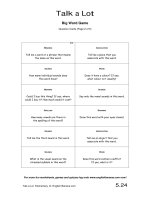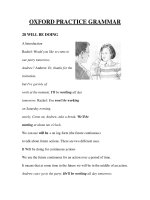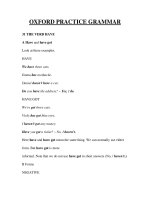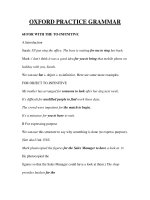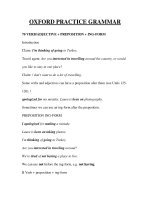Tài liệu Free English Grammar docx
Bạn đang xem bản rút gọn của tài liệu. Xem và tải ngay bản đầy đủ của tài liệu tại đây (1.06 MB, 54 trang )
Presented by
www.anglais-facile.com
Jonathan Lewis 2007
all rights reserved worldwide
You are free to distribute this ebook to as many people as you
wish
You may print this ebook
You MAY NOT sell this ebook
Thank You
Thank you for downloading this book. I hope it will help
you to understand better how the English language
works.
If you speak French and have some difficulties
understanding this all-English version, you can find
more explanations in French and practise exercises at:
www.anglais-facile.com
Introduction
There is a big difference between
understanding the grammar of a language and
being able to speak that language well.
You don’t need to understand how a car engine
works in order to drive a car.
And you don’t need to understand grammar to
speak a language.
Knowing grammar will, however, perhaps give
you more confidence to speak, as you will be
less afraid of making mistakes.
Almost every grammar rule has an exception,
so the best way to improve your English is to
practise as much as you can.
About anglais-
facile.com
www.anglais-facile.com was created to help French
speakers learn English for free. You will find explanations
of the grammar presented in this book in French as well as
lots of good advice on how to learn a foreign language.
About Jonathan Lewis
Jonathan Lewis has taught English in France for six years,
and has worked for the French ministry of education
(Education Nationale) as teacher and examiner. In his
native England, he used to train young people in sales and
business administration. He doesn’t like the traditional
grammar-based approach to language learning, but prefers
to teach communicatively, that is, by getting to students to
talk in class, while monitoring their use of language. Visit
his blog (in English) at:
Table of contents
Unit
1. I am – You are (to be)
2. I am doing (present progressive)
3. I like/do/go (present simple)
4. Have/Have got (possession)
5. I was/you were (be –simple past)
6. I did/worked/went (simple past)
7. I was doing (past progressive)
8. I have done (present perfect)
9. Is done/was done (passive voice)
10. Used to (finished actions)
11. Get/be used to (changing situations)
12. Will do (future)
13. Going to (planned future)
14. Had done (past perfect)
15. a/some (articles, quantities)
16. Some/any (quantities)
17. Much/many/a lot (quantities)
18. Can/could (ability/permission)
19. Must/have to (obligation/prohibition)
20. Big/small/beautiful (adjectives)
21. Big/bigger/biggest (comparatives and superlatives)
22. Should (advice, recommendations)
23. I/me/my/mine (pronouns, possessive adjectives)
24. What/when/where (questions 1)
25. How much/many (questions 2)
26. On/it/at (time prepositions)
27. What would you do? (conditionals)
Unit 1
I am (I’m)
This is John. He’s American, he’s thirty-five, he’s a
salesman.
I’m single
I’m American
I’m John
I’m thirty-five
I’m a salesman
I’m interested in politics
I am (I’m)
You are (you’re)
He is (he’s)
She is (she’s)
We are (we’re)
They are (they’re)
I am not (I’m not)
You are not (you’re not)
He is not (he’s not)
She is not (she’s not)
We are not (we’re not)
They are not (they’re
not)
You are are you?
To make questions, change the verb and the subject:
Positive Question
He is French Is he French?
You are late Are you late?
They are nurses Are they nurses?
Am/is/are are the present forms of the verb to be. We call
this verb a ‘state verb’.
State
• Age: I am thirty
• Nationality: I am French
• Status: I am single/married/divorced
• Profession: I am a teacher/secretary/manager
• Physical state: I am tired/hungry/cold
• Emotional state: I am happy/sad/excited
Tip
Make a mind map about your life, using ‘I am’.
Unit 2
I am doing
The verb ‘to be’ can be used as an auxiliary verb before
other verbs. The verb that follows always has the ending ‘-
ing’.
‘to be’ represents a present state, so when it’s followed by
a verb (-ing) it refers to a present activity.
• I’m a teacher, but I’m not teaching now, I’m
preparing a lesson
• Susan is wearing a pretty dress today
• Take an umbrella, it’s raining
Spelling
Note the following spelling changes:
write writing run running
come coming swim swimming
dance dancing sit sitting
lie lying
Negative
Place ‘not’ after the auxiliary:
I’m not sleeping
They’re not working -or - they aren’t working
She’s not reading - or - she isn’t reading
Questions
Change the order of words:
• Are you sleeping?
• Is he playing?
!
Unit 3
I like/do/go
The Present Simple
The present simple is used for things in general, and things
that happen sometimes or always:
• The sun rises in the east
• I work from nine till five
• I like chocolate
• I go to the cinema on Saturdays
To indicate frequency, we use these adverbs:
always usually often sometimes
never
100%
0%
"
I like
You like
He likes
She likes
We like
They like
I don’t like
You don’t like
He doesn’t like
She doesn’t like
We don’t like
They don’t like
• I always go shopping on Fridays
• I usually have coffee with my breakfast, but
sometimes I have tea
• I never watch American movies
• I often buy a newspaper on my way to work
Present simple spelling
Note the following spelling changes:
I watch
she watches
I kiss
he kisses
I wash
she washes
I judges
he judges
I study
she studies
I try
he tries
I do
she does
I go
he goes
Present simple questions
We use the verb ‘do’ as an auxiliary when we ask
questions:
• Do you read a lot?
• Do they live here?
• Does she like her job?
• Do you always arrive early?
• What do you usually do in your free time?
Unit 4
have/have got
She has blue eyes and black hair
=
She’s got blue eyes and black hair
(has got)
For possession, have and have got are the same
Have got in questions
• Have you got the time?
• Has she got a car?
Have got in negatives
• I haven’t got a car
• He hasn’t got a job
I’ve got a cold and a high
temperature
Unit 5
I was/you were
The simple past
Present: am/is past: was
Present: are - past: were
• Yesterday, I was sick
• She lived in London when she was young
• Were you on time for the meeting?
• No, I wasn’t – I was five minutes late
I was
You were
He was
She was
We were
They were
#
Was I?
Were you?
Was he?
Was she?
Were we?
Were they?
I wasn’t (n’t = not)
You weren’t
He wasn’t
She wasn’t
We weren’t
They weren’t
Unit 6
– I
did/worked/went
Past simple
They watch television (present simple)
Yesterday, they watched television (past simple)
Past Present Future
I went I worked I stopped
English verbs can be divided into two groups – regular and irregular. In the past
simple, regular verbs end in –ed ; they do not change according to the subject:
• I worked
• You worked
• He worked
• She worked
• We worked
• They worked
Irregular Verbs
These verbs are called irregular because they do not end
in ‘ed’ like regular verbs. You must learn these verbs by
heart.
Examples of irregular verbs:
• Begin began
• Break broke
• Buy bought
• Come came
• Do did
• Drink drank
• Eat ate
• Find found
• Get got
• Give gave
• Go went
• Have had
• Know knew
• Leave left
• Make made
• Pay paid
• Put put
• Read read (pronounced
‘red’)
• Ring rang
• Say said
• Think thought
you will find a list of irregular verbs here:
/>
Negative and Questions
Use the auxiliary did for questions and negatives in the past:
Positive Negative Question
I went I didn’t go did you go?
I worked I didn’t work did you work?
I had I didn’t have did you have?
Ago
We use ago for things in the past.
• Giovanni moved to Rome in 1999
• Giovanni moved to Rome 9 years ago
• Did you meet The Queen?
• Yes, but that was a long time ago
$$
Unit 7
I was doing
Past progressive
$!$
4:00 today: they are watching
television
4:00 yesterday: they were jogging
I was doing
You were doing
He/she/it was doing
We were doing
They were doing
I wasn’t doing
You weren’t doing
He/she/it wasn’t doing
We weren’t doing
They weren’t doing
#
was I doing ?
were You doing ?
was He/she/it doing ?
were We doing ?
were They doing ?
Timelines
9:00am 12:00pm
I started I stopped
Working working
I was working
We use the past progressive when we are more interested in the action
itself than the time it started or stopped.
Compare the past simple with the past progressive:
11:00pm 7:00am
12:00am
I went to bed the telephone I woke up
rang
=
I was sleeping when the telephone rang
time
$"$
I was sleeping
I was going to the office
It was raining
%&&
'&&
%(
)*
+)(
(
%))
*
Unit 8
I have done
Present Perfect
Johan has gone out = Johan is not here
NOW
The cook has made some pizzas.
The pizzas are ready NOW
The present perfect is used to show the present result of something that
has happened.
Present perfect: auxiliary have + past participle (gone/done/been etc)
$$
Compare the present perfect with the simple past:
• Yesterday, I lost my keys. I found them this morning.
• I’ve lost my keys (I can’t find my keys now)
• I bought this book last week, but I haven’t read it.
Positive Negative Question
We can use the present perfect with already, just, yet:
• I don’t want to watch this film, I’ve already seen it
• Are you hungry? – No, I’ve just eaten
• I’m waiting for Sean, he hasn’t arrived yet
$$
I have done
You have done
He/she/it has
done
We have done
They have done
I haven’t done
You haven’t done
He/she/it hasn’t
done
We haven’t done
They haven’t done
have I done ?
have you done ?
has he/she/it done ?
have we done ?
have they done ?
How long have you…?
Ivan moved to London in 2002. He lives in London now.
How long has Ivan lived in London?
- Ivan has lived in London for five years
This is Juan.
Juan is married to Jeanne
They have been married since 1999
Juan’s best friend is Ian.
Juan has known Ian for ten years
Juan likes playing tennis
He has played tennis since he was a child
Juan works for Macroloft corporation.
He has worked for Macroloft for five years
Juan is learning Spanish (present progressive)
He has been learning Spanish for six months (present perfect
progressive)
$$
Have you ever…?
We can use the present perfect to talk about our experiences in life. If
you want to know when something happened, use the simple past.
• Have you ever played poker?
• Yes I have.
• When did you play poker?
• I played when I was on holiday in Las Vegas
Been
When we say ‘have you ever been to Italy?’ been is the past participle of
the verb to go. Been then, is like a return trip.
I went to Italy
I came back from Italy
=
I’ve been to Italy (at sometime in my life)
$$
%),-
./%
0,-
/%1%
0
For and Since
Compare these sentences:
• I’ve lived in New York for ten years
• I’ve lived in New York since 1998
Since is used for a specific time:
• I’ve had this car since August
• I’ve known Jean since 1980
• I’ve had this headache since this morning
For is used for a duration of time
• I’ve had this car for six months
• I’ve known Jean for 27 years
• I’ve had this headache for several hours
$$




